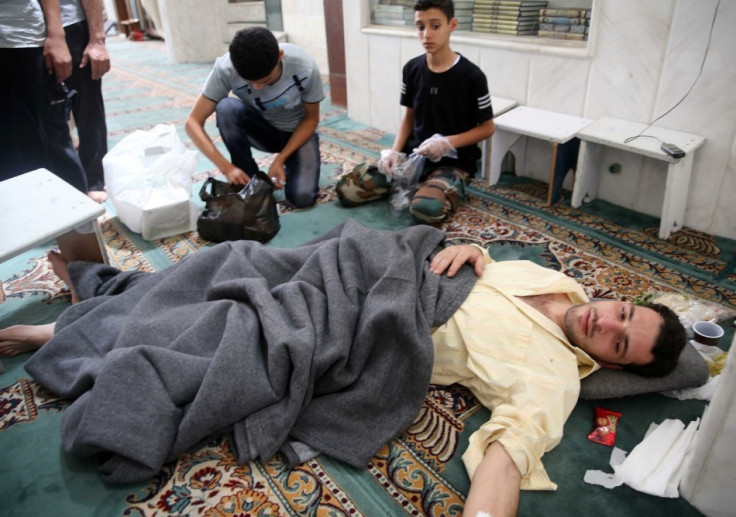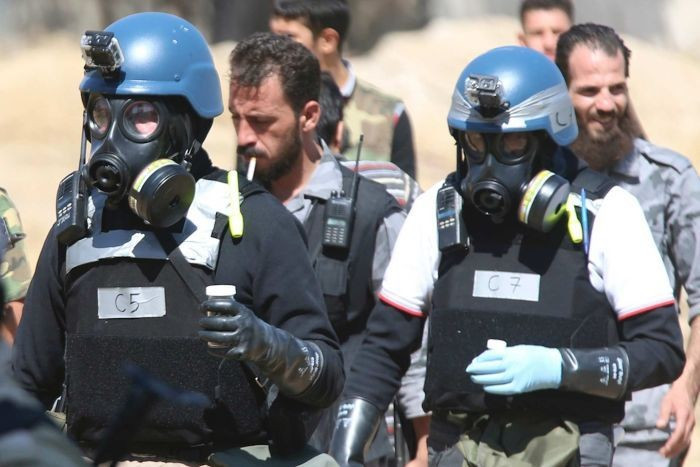Syria Crisis: Hezbollah Wiretaps Reveal Assad Ordered Sarin Attacks after 'Losing his Nerve' [VIDEO]
Intercepted phone calls prove Assad was behind atrocities, says Germany's BND spy agency

German intelligence agents say they have new evidence that the Syrian regime was behind the chemical weapons attacks on rebel-held areas of Damascus which left more than 1,400 dead.
The agents added they were almost certain that the chemical agent used was the nerve gas sarin.
German intelligence intercepted a telephone conversation between a senior member of the Lebanese militant group Hezbollah and Iranian diplomats in Beirut, said Gerhard Schindler, the head of Germany's foreign intelligence agency, the Bundesnachrichtendienst (BND).
The high-ranking Hezbollah operative admitted that poison gas was used but said that he believed that Assad had "lost his nerve" and "made a big mistake" by ordering the attack.
According to Schindler, Assad was desperate to halt the rebel advances in the suburbs of Syria's capital after a mortar attack on the president's motorcade as he travelled to a mosque during Ramadan.
Schindler said that the BND had intercepted a separate telephone call in the immediate aftermath of Ghouta attack in which a doctor treating the victims was able to describe in precise terms the symptoms they were suffering. All symptoms were consistent with the use of sarin.
In a secret briefing to senior German legislators, Schindler said he believed that similar weapons had been used several times before the Damascus attack, according to the German news weekly, Der Spiegel.
However, Schindler said that in earlier attacks, the gas may have been diluted, causing fewer deaths. He said that while the evidence was not incontrovertible, analysis had led his agents to believe the regime was to blame.
Only the Assad regime was in possession of binary chemical weapons such as sarin, he added.
The sarin signature
Errors in preparation of the chemical agents may have made it more potent than intended, speculated Schindler.
His evidence appeared to tally with information released by US intelligence services, which suggested sarin gas was delivered via missiles fired from mobile launch units.
Casings recovered from the attack sites indicated that they were 107mm rockets, which the regime possesses in large numbers.
Hair and blood samples from victims showed sarin "signatures", according to US Secretary of State John Kerry.
Schindler said he did not believe the rebels were capable of such an attack, despite receiving assistance from governments opposed to the regime in Damascus, such as Saudi Arabia and Qatar.
Germany is understood to have ships posted off the Syrian coast, equipped with listening equipment capable of intercepting communications inside Syria.

The Assad regime denies it used chemical weapons and claimed that rebel groups including the al-Qaida-linked al-Nusra Front were supplied by the Saudi government.
Syrian state TV reported in July that the regime had recovered stockpiles of chemical agents, which were being stored in rebel-held areas of Damascus, including the suburb of Jobar, which was one of the areas hit in the 21 August onslaught.
Regime forces said they confiscated 281 barrels "filled with dangerous, hazardous chemical materials" after finding them in weapon stockpile in the city of Banias on 7 July.
Chemicals including monoethylene glycol and polyethylene glycol were recovered, along with canisters and stockpiles of corrosive agents bearing Saudi factory markings, according to Russian media.
Syria's UN ambassador Bashar Ja'afari said that the chemicals recovered in Jobar were "capable of destroying a whole city, if not the whole country".
Russia, Iran and Hezbollah have backed Assad's regime, while Saudi Arabia, Turkey and the West have called for its downfall.
READ:
Cameron Shifts Focus to Humanitarian Aid for Syria
Israel Tested Anchor Missiles in Mediterranean in Joint Military Exercises with US
Syria Conflict Could Turn into another World War, Warns Vatican
© Copyright IBTimes 2025. All rights reserved.





















